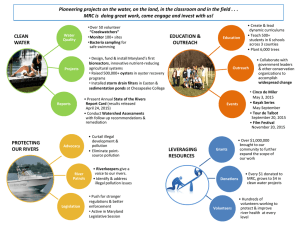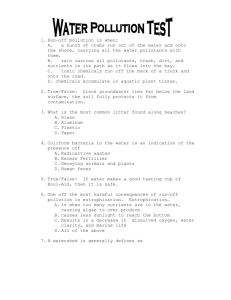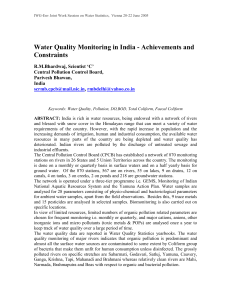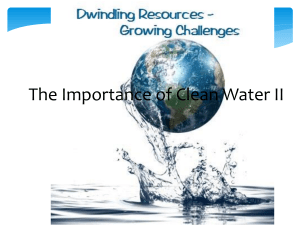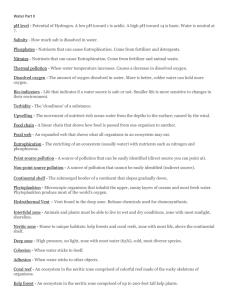Water Pollution
advertisement
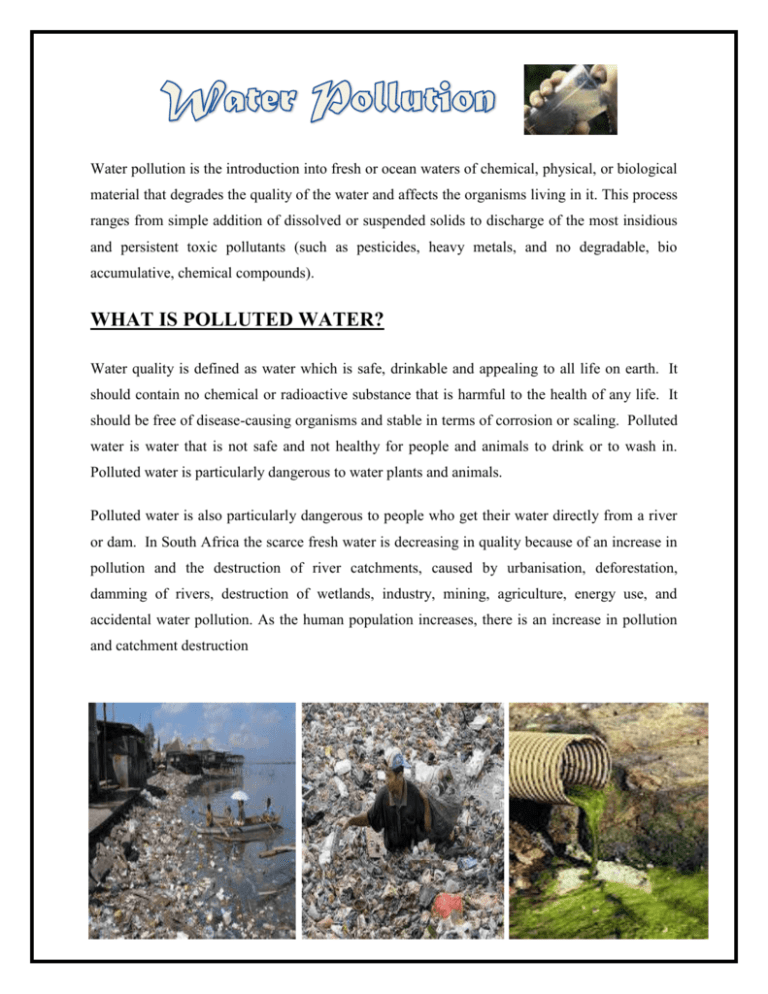
Water pollution is the introduction into fresh or ocean waters of chemical, physical, or biological material that degrades the quality of the water and affects the organisms living in it. This process ranges from simple addition of dissolved or suspended solids to discharge of the most insidious and persistent toxic pollutants (such as pesticides, heavy metals, and no degradable, bio accumulative, chemical compounds). WHAT IS POLLUTED WATER? Water quality is defined as water which is safe, drinkable and appealing to all life on earth. It should contain no chemical or radioactive substance that is harmful to the health of any life. It should be free of disease-causing organisms and stable in terms of corrosion or scaling. Polluted water is water that is not safe and not healthy for people and animals to drink or to wash in. Polluted water is particularly dangerous to water plants and animals. Polluted water is also particularly dangerous to people who get their water directly from a river or dam. In South Africa the scarce fresh water is decreasing in quality because of an increase in pollution and the destruction of river catchments, caused by urbanisation, deforestation, damming of rivers, destruction of wetlands, industry, mining, agriculture, energy use, and accidental water pollution. As the human population increases, there is an increase in pollution and catchment destruction Causes of Water Pollution Urbanisation As more and more people move into cities and towns, a number of factors cause pollution: the physical disturbance of land due to construction of houses, industries, roads, etc. Chemical pollution from industries, mines, etc. Inadequate sewage collection and treatment increase in fertilizers to grow more food. These results in an increase in nutrients (nitrates and phosphates) in the water which causes enhanced plant growth. When this plant material dies and decays the bacteria uses the oxygen in the water. This lowering of oxygen levels results in the death of other water life that needs oxygen to survive, e.g. fish, etc. This process is called eutrophication; litter, which causes disease and has a negative visual impact. Deforestation Clearing land for agriculture and urban growth often leads to water pollution. When soil is stripped of its protective vegetation it becomes prone to soil erosion. This leads to an increase in the murkiness of the water which can cause the following: it can block the gills of fish; bottom dwelling plants cannot photosynthesize as the sun’s rays cannot reach them; and there is an increase in disease as bacteria and viruses use the soil particles as a method of transportation. Damming of rivers Damming of rivers can have an impact on water in the following ways: water flowing out of dams has reduced suspended material as a large amount settles to the bottom of dams; is depleted of nutrients; and is often more saline with detrimental effects on downstream agriculture and fisheries. Enhanced eutrophication may result due to the water spending a longer time in the dam. There is also increased evaporation in dams, especially those with a large surface area, such as the Vaal Dam. Industries Industries produce waste that can affect the pH of water (whether it is acid, neutral or alkaline); colour of water; amount of nutrients (increase in nutrients can cause eutrophication); temperature (increase or decrease in temperature can have an impact on temperature sensitive organisms living in the water); amount minerals and salts (too much can cause health problems) Murkiness of water (can block fish gills; bottom dwelling plants cannot photosynthesize as the sun’s rays cannot reach them; increase in disease as bacteria and viruses use the soil particles as a method of transportation). Mining Mines produce waste that can increase the amount of minerals and salts in the water (too much can cause health problems) Can affect the pH of the water (whether it is acid, neutral or alkaline) Can increase the murkiness of the water. Agriculture: Increases soil erosion due to the physical disturbance of soil and vegetation due to ploughing, overgrazing, logging and road building. This affects the murkiness and the amount of salts and minerals in water; Increases nutrients due to fertilisers and excreta, which contribute worrying amounts of nitrates and phosphates to water supplies (this can cause eutrophication) Energy Use As human populations increase, more energy is required for human activities such as cooking, lighting, etc. The majority of our energy in South Africa comes from the burning of coal at power stations and results in greatly increased emissions of sulphur and nitrogen oxides into the atmosphere. These gases are the main cause of acid rain, which has a negative impact on the natural environment and human health. Accidental Water Pollution Accidental water pollution can arise from many sources (such as burst pipes and tanks, major leaks, fires and oil spills) and can cause varying degrees of damage, depending on the quantity, toxicity and persistence of the pollutant, and the size and adaptability of the water body. Examples of Water Pollution Industrial effluents Water is discharged from after having been used in production processes. This waste water may contain acids, alkalis, salts, poisons, oils and in some cases harmful bacteria. Mining and Agricultural Wastes Mines, especially gold and coal mines, are responsible for large quantities of acid water. Agricultural pesticides, fertilisers and herbicides may wash into rivers and stagnant water bodies. Sewage Disposal and Domestic Wastes Sewage as well as domestic and farm wastes were often allowed to pollute rivers and dams. Here are some comtrol measures The following measures can be used to stop water pollution: Every intelligent people should be wise enough not to pollute water in any way; By research and legislation the pollution of water bodies, even though not entirely prevented, must be effectively controlled. The following video will explain the facts mentioned above
